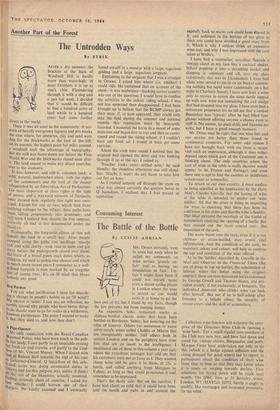Another Part of the Forest
The Untrodden Ways
By STRIX Once it was an asset to the community. A net- work of heavily overgrown lagoons and pits marks the sites where, for centuries, clay and sand were dug for the brickworks at the foot of the hill; on its summit, the highest point for miles around, a windmill took the advantage of topography. But the mill was burnt down just before the First World War and the brickworks closed soon after it. The land ceased to make any direct contribu- tion to the economy.
It was, however, and still is, common land : a Wild, natural, undisturbed place. with the rights of the commoners and the lord of the manor safeguarded by an Edwardian Act of Parliament. The most important of these rights is the right of access, and a wayward network of footpaths once showed how regularly this right was exer- cied. Except for one or two, which lead from Outlying cottages to the village, these paths have been falling progressively into desuetude; and laSt week I noticed that, despite the fine summer, virtually all had at last disappeared under the bracken.
Ecologically, the long-term etlects of this will benefit the ,land in a small way. After people stopped using .the 'Paths tree seedlings—mostly oale and wild cherry—took root in them and got away before the undergrowth closed over them; the race of a broad green track down which, as children, we used to gallop two abreast and which in-much more recent years I remember as a well- defined footpath is now marked by an irregular line of young trees. It's an ill wind that blows nobody any good.
Beg Pardon
You ask what justification I have for describ- ing a change in people's habits as an 'ill wind'? MY answer is 'none.' I can see; on reflection, no earthly reasoti why people who have better things tO do should want to go for walks in a wilderness, however picturesque. The point I wanted to make is that they used to, and now they don't. - 4 PiPe-Opener
My only connection with the Royal Canadian Mounted Police, who have been much in the pub- lic eye lately, I owe partly to an insatiable craving for fresh air and exercise and partly to the kind- ness of Mr. Vincent Massey: When I stayed with him at Rideau Hall towards the end of his tour
Governor-General. Q Squadron of this cele- brated corps was doing ceremonial duties in Ottawa and for this purpose was, unlike (I think) VI the rest of the Mounties, actually mounted. eeling seriously short of exercise, I asked my host whether I could borrow • one of their chargers. He 'kindly assented and I eventually found myself in a manage with a large, sagacious gelding and a large, sagacious sergeant.
Explaining to the sergeant that I was a stranger to Ottawa, I asked him where (i.e. whither) I could ride. He explained that on account of the snow—it was midwinter—hacking across country was out of the question; I would have to Confine my activities to the indoor riding school. I was not less surprised than disappointed. I had been brought up to believe that the RCMP always got their man; if, as now appeared, they could only take the field during the summer and autumn months this reputation must be insecurely founded. I mounted the horse in a mood of some dejection and began first to trot and then to canter round and round the riding school; if I couldn't have any fresh air I would at least get some exercise.
About the sixth time round I noticed that the sergeant had opened the door and was looking through it up at the sky. I reined in.
'Weather looks more settled now,' he said blandly; the cloudless afternoon was still cloud- less. 'Maybe it won't do any harm to take him out for an hour.'
As I trotted sedately off through the snow on what was almost certainly the quietest horse in Q Squadron, I realised that I had passed in equitation.


































 Previous page
Previous page